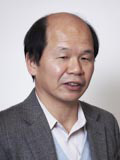SATO Yukihito

| SATO Yukihito |
| [Belonging・Position] | Research Administration Department・Senior Research Fellow |
| [Research Field] | Industrial development in Taiwan and East Asia and Taiwan’s economic society |
| [email] |
Yukihito_Sato 
|
| researchmap | Profile Information (Research history, education, papers & publications) |
| Japanese page |
Previous research
I joined the Institute of Developing Economies after graduating from Faculty of Economics, the University of Tokyo in 1986. I stayed in Taiwan for about three years starting in 1989 (in the first year I was on leave of absence and converted to an overseas researcher of IDE in the second year). During that time, I studied at Institute of Economic Research, the National Taiwan University and earned a master’s degree in 1991.
I stayed in Taiwan again for two years starting in 2001 and conducted research as a visiting scholar at the Institute of Sociology, the Academia Sinica. The results of my research were published in my 2007 book, The Formation and Development of the Taiwan's High-Tech Industresy (the publisher is Iwanami Shoten), which received a special prize of the Asia-Pacific Award in the same year. In 2008, I earned my doctorate from Graduate School of Economics, the Kobe University.
I have been in my current position since April 2021.
Current research projects
I have two main research themes. One is industrial development in Taiwan and other East Asian countries. In particular, I have focused on the high-tech industriesy. Since Taiwan’s semiconductor industry has attracted attention not only in Japan but also globally since the beginning of the 2020s, I would like to further advance my research. In addition, I have also been doing research on several manufacturing sectors such as the steel, motorcycle, bicycle, and machine-tools industries and have recently expanded my interests to biotechnology, convenience stores, and entertainment.
My other research theme is Taiwanese economic society. The topics I have studied are the effects of democratization on financial systems, the personal identity of Taiwanese entrepreneurs and business people living in China, and Taiwanese young people’s views on China as a place of work. In the future, I also have a desire to try to look into Taiwanese society from the perspective of tax.

